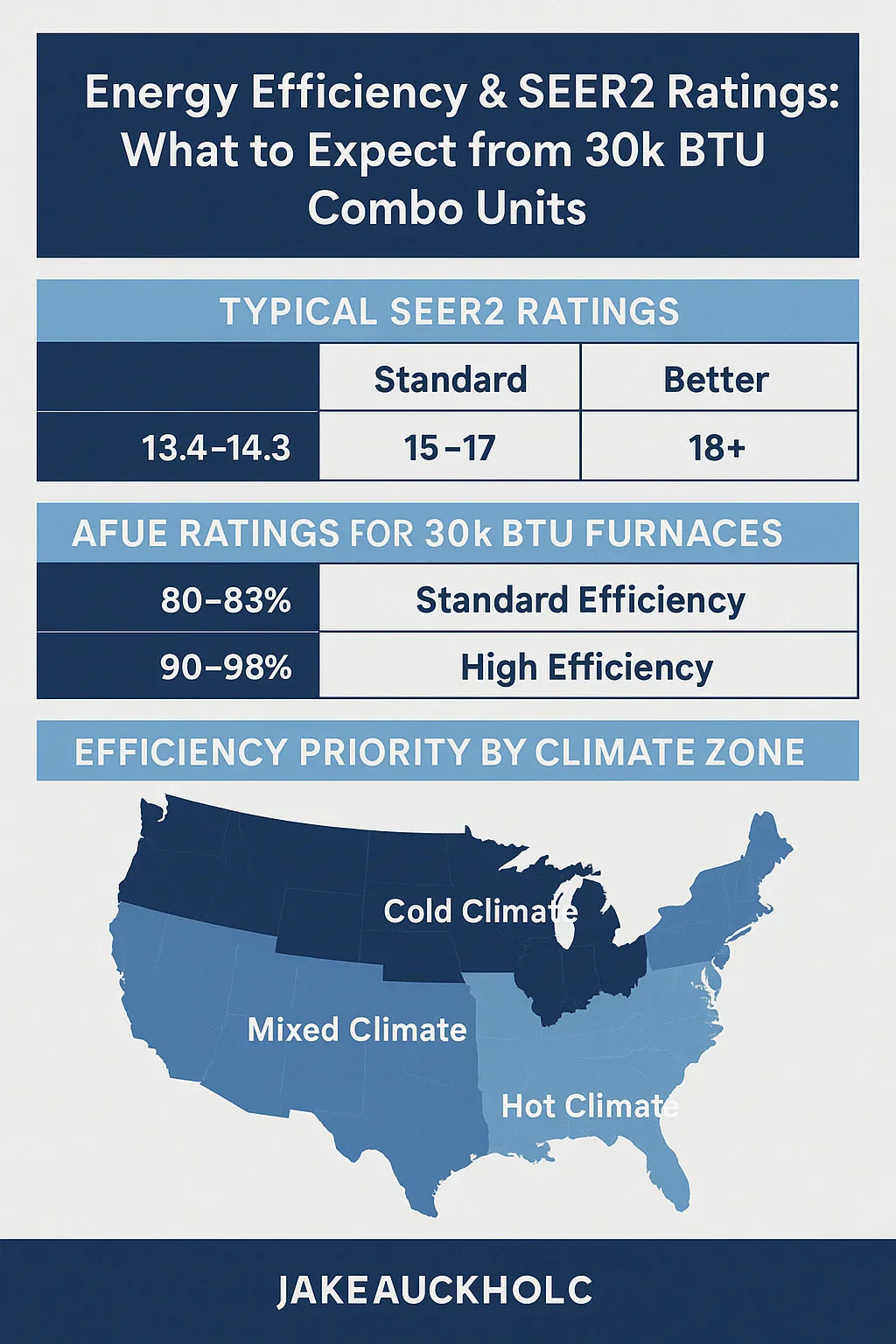When you’re looking at 30,000 BTU furnace & air conditioner combo systems, you’re probably checking the price tag, the brand, maybe even the warranty. But if you really want to predict how that system will treat your wallet month after month, you need to pay attention to two numbers: SEER2 and AFUE.
I’m Jake, and over the years I’ve seen plenty of homeowners focus only on “tonnage” or BTUs and end up disappointed when their utility bills didn’t drop. Understanding efficiency ratings is the key to making a smart HVAC investment—especially for a 30k BTU system that will likely be running in both heating and cooling seasons.
1. Why Efficiency Matters
A properly sized and efficient system:
-
Uses less energy to achieve the same comfort.
-
Lowers utility bills year-round.
-
Reduces wear and tear so it lasts longer.
I’ve installed high-SEER2 units that paid for themselves in energy savings within five years. I’ve also seen low-efficiency units cost owners thousands more than they expected over a decade.
2. What Is SEER2?
SEER2 stands for Seasonal Energy Efficiency Ratio 2. It’s the updated standard that replaced SEER starting in 2023.
How it’s calculated:
-
Measures cooling output (in BTUs) over an entire season.
-
Divides that by the total watt-hours of electricity used.
-
Adjusts for more realistic testing conditions, like higher external static pressure in ductwork.
Jake’s Note: SEER2 ratings are typically about 4–5% lower than old SEER ratings for the same system. So if you’re comparing, remember it’s apples to oranges.
3. Typical SEER2 Ratings for 30,000 BTU Units
Minimum requirements (as of 2025):
-
North region: 13.4 SEER2
-
South/Southwest regions: 14.3 SEER2
Typical range for 30k BTU combo systems:
-
Entry-level: 13.4–14.3 SEER2
-
Mid-range: 15–17 SEER2
-
High-efficiency: 18+ SEER2
| Rating | Category | What to Expect |
|---|---|---|
| 13.4–14.3 | Standard | Meets minimum code, lower upfront cost |
| 15–17 | Better | Noticeable energy savings, often quieter |
| 18+ | Best | Highest comfort, lowest bills, higher upfront price |
4. Don’t Forget the Furnace: AFUE Ratings
On the heating side, you’ll see AFUE—Annual Fuel Utilization Efficiency.
What it means:
-
Measures how much of the fuel you buy actually becomes usable heat in your home.
-
An 80% AFUE furnace converts 80% of its fuel into heat; 20% is lost through exhaust.
-
A 95% AFUE furnace wastes only 5%.
AFUE Ranges for 30k BTU Furnaces:
-
Standard: 80–83% AFUE
-
High efficiency: 90–98% AFUE
5. How Efficiency Affects Operating Costs
Here’s a quick example for a 1,000 sq. ft. home running a 30,000 BTU combo in a moderate climate:
Cooling Season (4 months)
-
13.4 SEER2 unit: ~$420/year in electricity
-
17 SEER2 unit: ~$330/year in electricity
Savings: ~$90/year
Heating Season (4 months, natural gas)
-
80% AFUE: ~$320/year in gas
-
95% AFUE: ~$270/year in gas
Savings: ~$50/year
Over 10 years, that’s $1,400 saved just from efficiency gains—without factoring in any energy rate increases.
6. Climate Zone Considerations
Efficiency priorities shift depending on where you live:
-
Hot climates (Zones 1–3) → Higher SEER2 matters more. Your AC runs longer, so cooling efficiency saves more.
-
Cold climates (Zones 5–7) → Higher AFUE matters more. Heating dominates your energy use.
-
Mixed climates (Zones 4–5) → A balanced approach to both SEER2 and AFUE makes the most sense.
7. Why Real-World Efficiency Can Differ from Ratings
Just because the label says 17 SEER2 doesn’t mean you’ll see that performance at home. Common issues:
-
Leaky ductwork wasting cooled/heated air.
-
Improper installation reducing airflow and efficiency.
-
Dirty filters or coils forcing the system to work harder.
-
Thermostat misuse, like constant temperature changes.
8. Features That Boost Efficiency
Look for these when comparing 30k BTU combos:
-
Variable-speed blower motors → Maintain steady temps with less energy.
-
Two-stage compressors → Match output to demand instead of running full blast all the time.
-
Smart thermostats → Adjust settings automatically to save energy.
-
Enhanced coil designs → Improve heat transfer.
9. Comparing 30k BTU Combo Units
When I compare options for homeowners, I look at:
-
SEER2 for cooling efficiency.
-
AFUE for heating efficiency.
-
Warranty length and coverage.
-
Feature set (variable speed, smart controls).
-
Rebates from local utilities or federal programs.
10. Maintenance & Efficiency Over Time
Even the best-rated system loses efficiency if you don’t maintain it.
-
Quarterly: Replace or clean filters.
-
Annually: Have a pro inspect coils, refrigerant, blower, and ducts.
-
Every 3–5 years: Duct cleaning and sealing if needed.
11. Jake’s Quick Decision Guide
-
Hot climate: Prioritize SEER2.
-
Cold climate: Prioritize AFUE.
-
Mixed climate: Aim for both mid-to-high SEER2 and high AFUE.
-
Balance upfront cost with long-term savings.
12. Conclusion
For most homeowners, a 30,000 BTU combo unit with 15+ SEER2 and 90%+ AFUE strikes the best balance between comfort, energy savings, and cost. If your climate pushes you heavily toward cooling or heating, lean into that efficiency rating.
In the next article we will know more about: Installation Guide: What Jake Checks Before Setting Up a 30,000 BTU Furnace/AC System







